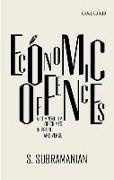Read more
In the last decade or so, and at a dizzyingly increasing rate, India has come to be recognized as 'a force to reckon with'. This book is a satirical social commentary on contemporary India. Employing the literature of one's childhood and evocative line drawings, the book casts a critical eye on an unflattering list of the nation's real or imagined concerns: from caste, pseudosecularism, minorityism, poverty, tradition, modernity, and postcoloniality to liberalization, corruption, competition, nationalism, and NRI-ism.
List of contents
- Acknowledgements
- Apologia, viz. Sorry!
- SECTION I?PROSE FOLLIES-Understanding Economics: A Child's Guide to Some Major Themes
- Family Life: Globalization: A Story from the Indian Diaspora
- The Economics of Crime: Naughty Ata
- The Competitive Economy: Fata's fate
- The Way of the Little Scholar: Human Capital: Tata's Test
- Field Studies and Inter-Disciplinarity: Whimsy in the Woods (or) Arcadia in the Academy
- The Rhetoric of Economics, and Other Rhetorics: Hari Podder and the Qitchddi Contest
- Pedagogy in Economics: 1936 And All That
- Old Favourites: Games and Economic Behaviour: Brer Rabbit and the Cricket Match
- Human Development: Alice and the Seven Per Cent Solution
- Learning to Swim (or) the Moral Currents of Current Morals: Moral and Political Economy: Hitopadesa for the New Millennium
- Law and Society: Endgame
- Poverty: Tiger's Tale (or) The Poor Men of Hindostan
- Heroes of Our Times: Law and Economics: Contempt of Court
- Inflation: The Price of Food
- International Relations: High Loon
- SECTION II?VERSE FOLLIES
- The Lyrical Sides to Economy and Society: An Ode on Poverty
- Clerihews in Merry Hues: An A-to-Z of the Lives and Times of Economists in Jolly Rhymes
- Concavity: The Pivotal Point (or) The Mathematical Economist's Anthem
- Alcoholic Disclaimer
- Newspaper Verses 1: Brahmin Kosher
- Newspaper Verses 2: A Snake in the House
- FINIS-An Ending in Sweet Verse
About the author
S. Subramanian is Professor, Madras Institute of Development Studies.
Summary
In the last decade or so, and at a dizzyingly increasing rate, India has come to be recognized as 'a force to reckon with'. If it was 'India Shining' earlier, the present shibboleth is 'India Rising', or some other variant of it. This book is a satirical social commentary on contemporary India, aimed at correcting the view that the country has progressed to a point where it ought to be viewed either with exaggerated admiration or as a threat. The notion that it is a matter of legitimate urgency for India to be recognized, in quick order, as a super-power, as a permanent member of the United Nations' Security Council, and as 'number one' in the international cricket ratings, needs to be dispelled with.
The book employs the literature of one's childhood and evocative line drawings to critically look at an unflattering list of the nation's real or imagined concerns: caste, pseudosecularism, minorityism, poverty, tradition, modernity, postcoloniality, liberalization, corruption, competition, nationalism, and NRI-ism.

